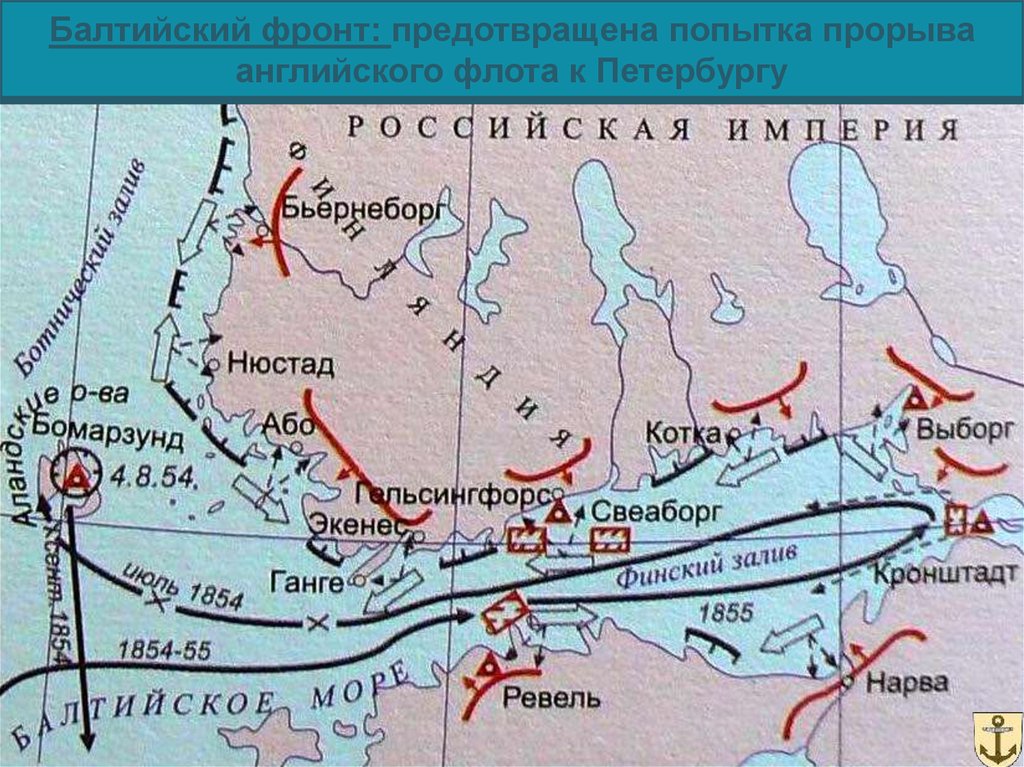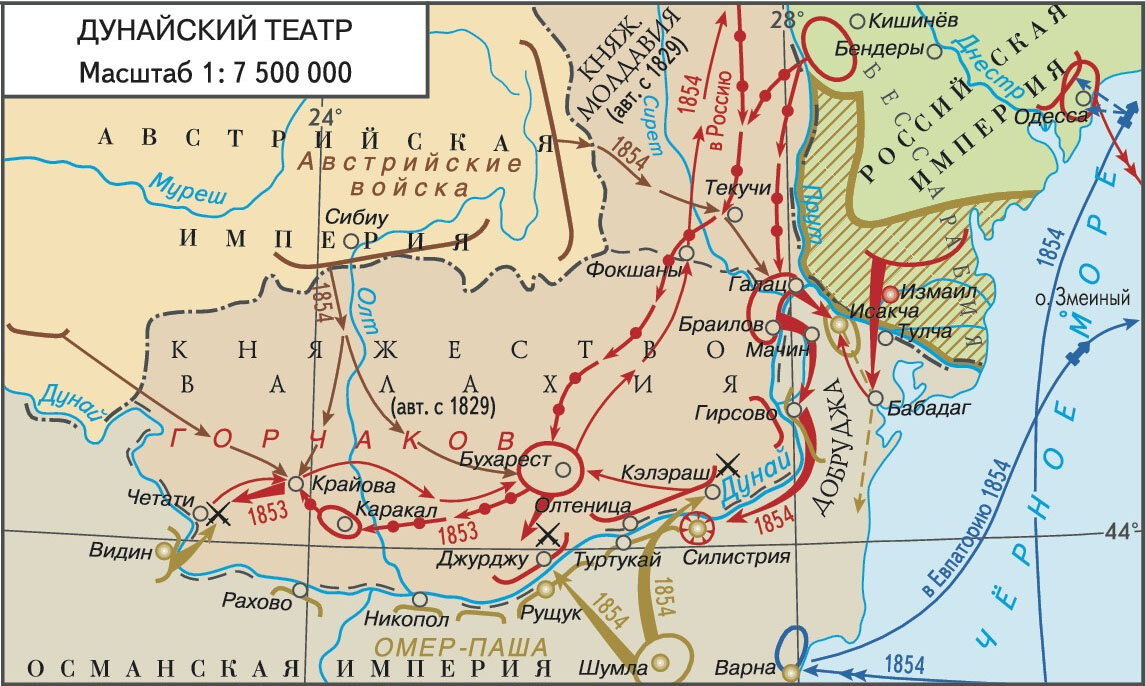What is known as The Crimean War was much larger and had far-reaching consequences not only for Russia but for many other states. In a way it is as much about Crimea as the “Caribbean Missile Crises” was about the Caribbeans. The theatres of war of 1853-1856 covered the Danube delta, the Baltic Sea, the Far East – the Kamchatka and Petropavlovsk-on-Amur that were under siege and partially captured during 1854-55.
While it is true, that one of the main battles happened in Crimea, it could better be described as the “Eastern War”. It was closer to a “world war”, and was definitely the second large “information war”.
Telling are the stated goals of the warring parties.
Initially, it was a war that Russia initiated against the Ottoman Empire. Ideologically, it was started to liberate the Orthodox Christian people of the Duchy of Moldavia (Romania did not yet get created – that would happen after that war). The more pressing geopolitical goal of Russia was to secure the Southern flanks and get control over the Bosphorus and the Dardanells, and influence over the Balkans. That decision did not come out of the blue, and was not a simple whim of Nicolas I. The Ottoman Empire had moved a 50,000 strong army that included Polish and Hungarian revolutionaries to the border of Austria, while at the same time trying to conquer Chernogoria (known in the West as “Montenegro”).
Russia had two military strategies – one assumed a large-scale assault along the Black Sea coast with landing parties deployed to the Turkish ports and to the straits. The other strategy was a limited “military operation” with crossing of the Danube, avoiding direct confrontation with the Turkish army, with the outlook that this limited display of force would lead to a favourable peace treaty with the Turks. The latter strategy was adopted. Drawing a historical parallel, it is similar to the peacekeeping operation in Georgia on the 8th of August 2008, when such strategy worked, or the start of the SMO in 2022, when it almost worked before the British forbade Ukraine to sign the peace treaty.
The same happened in 1853-54. The British used this opportunity to accuse Russia of aggression against Turkey, and build a coalition that fought with Russia on behalf of Turkey. France joined its not so recent adversary, Britain, partly for the sake of Poland and partly as a revenge for the 1814 defeat.
The stated goals of Britain have many points that would later be echoed in the “blessed pastures of Europe” proclaimed by Hitler or the “garden” of Borrell.
Lord Palmerston formulated them thus:
The Aaland Islands and Finland are returned to Sweden; the Baltic Region is given to Prussia; the Kingdom of Poland should be restored as a barrier between Russia and Germany [not Prussia, but Germany]; Moldavia and Wallachia and the entire mouth of the Danube are given to Austria, and Lombardy and Venice from Austria to the Kingdom of Sardinia; Crimea, Circassia and Georgia are being torn away from Russia; Crimea and Georgia are given to Turkey, and Circassia (modern-day Chechenia) becomes either independent or linked to Turkey by suzerainty relations
While Earl of Clarendon added that England is simply
…nobly and highly fundamentally leads the “battle of civilization against barbarism”
In 1854 the London “Times” wrote:
“It would be good to bring Russia back to the ploughing of internal land, to drive the Muscovites deep into the forests and steppes.”
In the same year D.Russel, leader of the House of Commons and the head of the Liberal Party, said:
“We have to pry the bear’s teeth … While his fleet and naval arsenal on the Black Sea is not destroyed, Constantinople will not be safe and there will not be any peace in Europe”
Then there was the third force – the revolutionaries, who sought to both to destroy Russia as a stronghold of monarchy, and to pit Russia against Britain and other monarchies, thus igniting the pan-European revolution.
Fridrich Engels in several articles in the British press published in the March-April 1853, accused Russia of an intention to capture Constantinople, although it was well known that the Russian ultimatum of February 1853 contained no territorial claims against Turkey.
Karl Marx wrote in 1849, criticising British cautiousness with regard to Russia:
Without a doubt, the Turkish-European fleet will be able to demolish Sevastopol and destroy the Russian Black Sea fleet; the Allies will be able to capture and hold Crimea, occupy Odessa, block the Sea of Azov and free the hands of the Caucasian highlanders. What should be done in the Baltic Sea is as self-evident as what should be done in the Black Sea: it is necessary to achieve an alliance with Sweden at all costs; If necessary, intimidate Denmark, unleash an uprising in Finland by landing a sufficient number of troops and promising that peace will be concluded only if this province is annexed to Sweden. Troops landed in Finland would threaten St. Petersburg, while fleets would bombard Kronstadt
And what about Turkey? As a parallel, who asks Ukraine today?
The outcome of the war was unfavourable for all parties – one cannot say that anyone indisputably lost or won it.
In England itself, a significant part of society did not understand the meaning of the Crimean War, and after the first serious military losses, a strong anti-war opposition arose in the country and in parliament. Later, the English historian D. Trevelyan wrote that the Crimean War “was just a stupid expedition to the Black Sea, undertaken without sufficient reason, because the English people were bored with the world… The bourgeois democracy, excited by its favourite newspapers, incited a crusade for the sake of Turkish domination over the Balkan Christians…”
In this regard, it is worth accentuating the role of the press, and how it became the driving force, just as MSM is now.
Britain lost most of its young nobility in the cavalry charges, which lead to the degradation of the governing class.
Russia had to make certain concessions, but it did not lose control over the strategic Crimea. What is more significant, is that the outcome of the war strengthened the liberal tendencies in Russia, and sent in motion some well-meaning, but poorly-thought-out reforms that later acted as a catalyst for more social unrest, and ultimately a revolution (after which, the second attempt by Russia to control the Bosphorus also failed after signing of the “separate peace” with Germany). The economy of Russia was greatly weakened, which was one of the reasons for the sale of Alaska to finance building of the railways – the war uncovered dire need for better logistics across the country.
Accordig to the peace treaty signed in Paris on the 13th of February 1856,
- Russia returned to the Ottomans the cities of Kars with a fortress, Bayazet, Ardagan, Kagyzman, Olty and positions 5.5 km from Erzurum, receiving in exchange Sevastopol, Balaklava and other Crimean cities captured from it
- The Black Sea was declared neutral (that is, open to commercial and closed to military vessels in peacetime), with the prohibition of Russia and the Ottoman Empire to have military fleets and arsenals there. This alone was not a win for Turkey.
- The navigation along Danube was declared free, for which the Russian borders were moved away from the river and part of Russian Bessarabia was annexed to Moldavia, while the Danube Delta to the Ottoman Empire.
- Russia was deprived of the protectorate over Moldavia and Wallachia granted to it by the Treaty of Kucuk-Kainardzhiy in 1774 and of Russia’s exclusive patronage over the Christian subjects of the Ottoman Empire.
- Russia pledged not to build fortifications on the Aaland Islands.
During the war, the participants of the anti-Russian coalition failed to achieve all their goals, but they managed to prevent Russia’s strengthening in the Balkans and deprive it of the Black Sea Fleet for 15 years.
The representative of England, Count Clarendon, demanded the disarmament of the city of Nikolaev and the destruction of its shipyards in accordance with the peace treaty. However, Count Orlov stated that Nikolaev is not located on the Black Sea coast, but on the Bug river, and the terms of the agreement do not apply to it. During the negotiations, the issue of Russian forts on the eastern coast of the Black Sea was raised. Some of them were blown up during the war, and Clarendon stated that the forts are, in fact, the same as arsenals, only they are called differently. Therefore, Russia has no right to restore them. Orlov disagreed with him: in his opinion, the fort and the arsenal are different things.
With history moving on, Nikolaev was eventually yanked out of Russian control in 1992 with the dissolution of the USSR, when the port found itself in a different state, called Ukraine, and later becoming a de-facto American military base.
And what about Turkey? During the Eastern Campaign, the Ottoman Empire took a loan in England of 7 million pounds. In 1858, the bankruptcy of the Sultan’s treasury was declared. Sounds like Ukraine, again…
As we can see, the “Crimean” War is still raging on.



